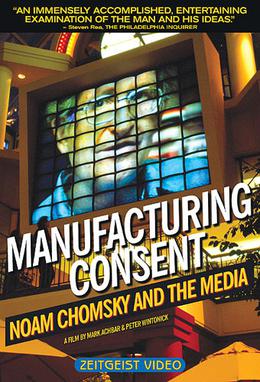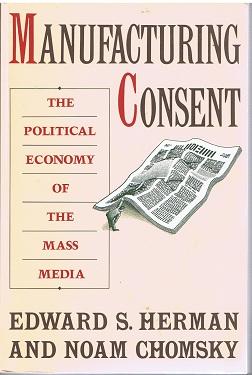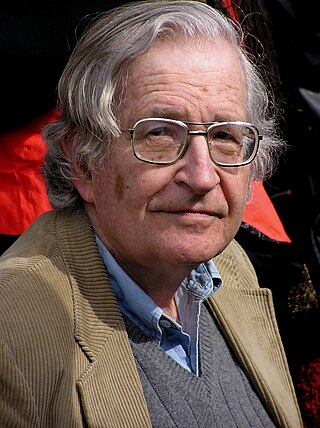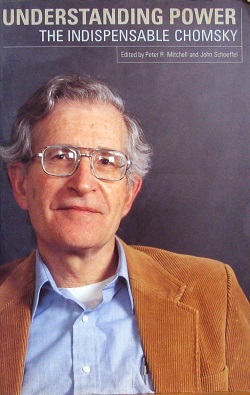See also
- Cultural engineering
- Mass media
- Noble lie
- Propaganda
- Social dynamics
- Social engineering (disambiguation)
- "The Engineering of Consent", a 1947 essay by Edward Bernays
Manufacturing Consent: The Political Economy of the Mass Media is a 1988 book by Edward S. Herman and Noam Chomsky.
Manufacturing Consent may also refer to:

Manufacturing Consent: Noam Chomsky and the Media is a 1992 documentary film that explores the political life and ideas of linguist, intellectual, and political activist Noam Chomsky. Canadian filmmakers Mark Achbar and Peter Wintonick expand the analysis of political economy and mass media presented in Manufacturing Consent, a 1988 book Chomsky wrote with Edward S. Herman.

Manufacturing Consent: The Political Economy of the Mass Media is a 1988 book by Edward S. Herman and Noam Chomsky. It argues that the mass communication media of the U.S. "are effective and powerful ideological institutions that carry out a system-supportive propaganda function, by reliance on market forces, internalized assumptions, and self-censorship, and without overt coercion", by means of the propaganda model of communication. The title refers to consent of the governed, and derives from the phrase "the manufacture of consent" used by Walter Lippmann in Public Opinion (1922). The book was honored with the Orwell Award.

Avram Noam Chomsky is an American professor and public intellectual who is known for his work in linguistics, political activism, and social criticism. Sometimes called "the father of modern linguistics", Chomsky is also a major figure in analytic philosophy and one of the founders of the field of cognitive science. He is a laureate professor of linguistics at the University of Arizona and an institute professor emeritus at the Massachusetts Institute of Technology (MIT). Chomsky has written more than 150 books on topics such as linguistics, war, and politics. Ideologically, he aligns with anarcho-syndicalism and libertarian socialism.
Z Communications is a left-wing activist-oriented media group founded in 1986 by Michael Albert and Lydia Sargent. It is, in broad terms, ideologically libertarian socialist, anti-capitalist, and heavily influenced by participatory economics, although much of its content is focused on critical commentary of foreign affairs. Its publications include Z Magazine, ZNet, and Z Video. Since early November 2022, they have all been regrouped under the name ZNetwork.

The propaganda model is a conceptual model in political economy advanced by Edward S. Herman and Noam Chomsky to explain how propaganda and systemic biases function in corporate mass media. The model seeks to explain how populations are manipulated and how consent for economic, social, and political policies, both foreign and domestic, is "manufactured" in the public mind due to this propaganda. The theory posits that the way in which corporate media is structured creates an inherent conflict of interest and therefore acts as propaganda for anti-democratic elements.
The following outline is provided as an overview of and topical guide to public relations:

Public Opinion is a book by Walter Lippmann published in 1922. It is a critical assessment of functional democratic government, especially of the irrational and often self-serving social perceptions that influence individual behavior and prevent optimal societal cohesion. The detailed descriptions of the cognitive limitations people face in comprehending their sociopolitical and cultural environments, leading them to apply an evolving catalogue of general stereotypes to a complex reality, rendered Public Opinion a seminal text in the fields of media studies, political science, and social psychology.
Edward Samuel Herman was an American economist, media scholar and social critic. Herman is known for his media criticism, in particular the propaganda model hypothesis he developed with Noam Chomsky, a frequent co-writer. He held an appointment as Professor Emeritus of finance at the Wharton School of Business of the University of Pennsylvania. He also taught at Annenberg School for Communication at the University of Pennsylvania.

Stephen Kinzer is an American author, journalist, and academic. A former New York Times correspondent, he has published several books, and writes for several newspapers and news agencies.
In political philosophy, the phrase consent of the governed refers to the idea that a government's legitimacy and moral right to use state power is justified and lawful only when consented to by the people or society over which that political power is exercised. This theory of consent is historically contrasted to the divine right of kings and had often been invoked against the legitimacy of colonialism. Article 21 of the United Nations' 1948 Universal Declaration of Human Rights states that "The will of the people shall be the basis of the authority of government".

Noam Chomsky is an intellectual, political activist, and critic of the foreign policy of the United States and other governments. Noam Chomsky describes himself as an anarcho-syndicalist and libertarian socialist, and is considered to be a key intellectual figure within the left wing of politics of the United States.

The Anti-Chomsky Reader is a 2004 anthology book about the linguist and social critic Noam Chomsky edited by Peter Collier and David Horowitz. Its contributors criticize Chomsky's political and linguistic writings, claiming that he cherry-picks facts to fit his theories.
The Center for Media and Public Affairs (CMPA) is a self-described nonpartisan and nonprofit research and educational organization that is affiliated with George Mason University in Fairfax, Virginia. It was founded in 1985 by political scientists S. Robert Lichter and his ex-wife Linda Lichter. It published a newsletter called Media Monitor from 1987 to 2010.
Counter-Revolutionary Violence: Bloodbaths in Fact & Propaganda is a 1973 book by Noam Chomsky and Edward S. Herman, with a preface by Richard A. Falk. It offers a critique of United States foreign policy in Indochina.
This is a list of writings published by the American author Noam Chomsky.
Alexander Edward Carey was an Australian writer, author, social psychologist, academic and sociologist. Praised for his work regarding corporate propaganda, Carey has influenced Noam Chomsky, Edward S. Herman and was called a "second Orwell in his prophesies" by Australian journalist and author John Pilger.
Supportive selling environment is an environment which allows for commodities to appear in attractive light. The term was used by Edward Herman and Noam Chomsky in their analysis of the propaganda model.

Cambodian genocide denial is the belief expressed by some Western academics that early claims of atrocities committed by the Khmer Rouge government (1975–1979) in Cambodia were much exaggerated. Many scholars of Cambodia and intellectuals opposed to the U.S. involvement in the Vietnam War denied or minimized reports of human rights abuses of the Khmer Rouge, characterizing contrary reports as "tales told by refugees" and U.S. propaganda. They viewed the assumption of power by the Communist Party of Kampuchea as a positive development for the people of Cambodia who had been severely impacted by the Vietnam War and the Cambodian Civil War. On the other side of the argument, anti-communists in the United States and elsewhere saw in the rule of the Khmer Rouge vindication of their belief that the victory of Communist governments in Southeast Asia would lead to a "bloodbath."

Understanding Power: The Indispensable Chomsky, published in 2002, is a collection of previously unpublished transcripts of seminars, talks, and question-and-answer sessions conducted by Noam Chomsky from 1989 to 1999.

The Political Economy of Human Rights is a 1979 two-volume work by Noam Chomsky and Edward S. Herman. The authors offer a critique of United States foreign policy, particularly in Indochina.